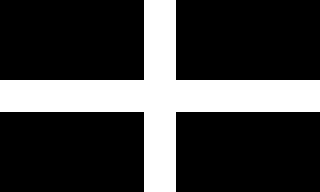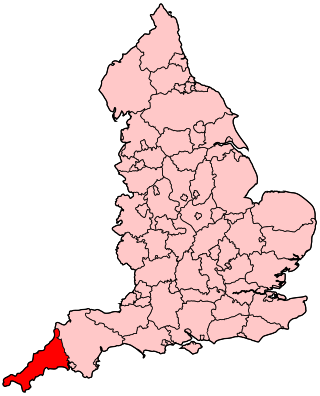Related Research Articles
A bardic name is a pseudonym used in Wales, Cornwall, or Brittany by poets and other artists, especially those involved in the eisteddfod movement.

Redruth is a town and civil parish in Cornwall, England, United Kingdom. The population of Redruth was 14,018 at the 2011 census. In the same year the population of the Camborne-Redruth urban area, which also includes Carn Brea, Illogan and several satellite villages, stood at 55,400 making it the largest conurbation in Cornwall. Redruth lies approximately at the junction of the A393 and A3047 roads, on the route of the old London to Land's End trunk road, and is approximately 9 miles (14 km) west of Truro, 12 miles (19 km) east of St Ives, 18 miles (29 km) north east of Penzance and 11 miles (18 km) north west of Falmouth. Camborne and Redruth together form the largest urban area in Cornwall and before local government reorganisation were an urban district.
Alfred Kenneth Hamilton Jenkin was a Cornish bard and historian with a particular interest in Cornish mining, publishing The Cornish Miner, now a classic, in 1927.

Cornwall Council, known between 1889 and 2009 as Cornwall County Council, is the local authority which governs the non-metropolitan county of Cornwall in South West England. Since 2009 it has been a unitary authority, having taken over district-level functions when the county's districts were abolished. The non-metropolitan county of Cornwall is slightly smaller than the ceremonial county, which additionally includes the Isles of Scilly. The council has had a Conservative Party majority since the 2021 local elections. Its headquarters is Lys Kernow in Truro.
Philip John Payton is a British-Australian historian and Emeritus Professor of Cornish and Australian Studies at the University of Exeter and formerly Director of the Institute of Cornish Studies based at Tremough, just outside Penryn, Cornwall. An Australian citizen, he is Professor of History at Flinders University in Adelaide, South Australia.

Cornish nationalism is a cultural, political and social movement that seeks the recognition of Cornwall – the south-westernmost part of the island of Great Britain – as a nation distinct from England. It is usually based on three general arguments:

Michael Kenneth Paynter is a retired Cornish civil servant, trade union activist, and poet. Apart from a period of study at the University of Newcastle, he has lived in St Ives.
Tony Snell is a Cornish teacher, linguist, scholar, singer, waterman and poet born in England. He spent many years teaching at St. Edward's School, Oxford. He became a member of Gorseth Kernow in 1954 under the Bardic name of Gwas Kevardhu. During the 1970s, he led the folk group Tremenysy (Travellers).

Helena Sanders née Charles was a Cornish humanitarian, cultural activist, politician and poet. Sanders was the founder of the political party, Mebyon Kernow, in 1951. She was also well known for her feline welfare efforts in Venice.
Haldreyn is the bardic name of William Morris. He is a Cornish poet, linguist, and painter. Haldreyn was an original member of Kesva an Taves Kernewek and is a bard of the Gorseth Kernow, appointed in 1966.

Richard Garfield Jenkin, was a Cornish nationalist politician and one of the founding members of Mebyon Kernow. He was also a Grand Bard of the Gorseth Kernow.
Garry Harcourt Tregidga is a Cornish academic, director of the Institute of Cornish Studies at the University of Exeter's Penryn Campus in Cornwall, UK, and editor of the journal Cornish Studies.
The Cornish dialect is a dialect of English spoken in Cornwall by Cornish people. Dialectal English spoken in Cornwall is to some extent influenced by Cornish grammar, and often includes words derived from the Cornish language. The Cornish language is a Celtic language of the Brythonic branch, as are the Welsh and Breton languages. In addition to the distinctive words and grammar, there are a variety of accents found within Cornwall from the north coast to that of the south coast and from east to west Cornwall. Typically, the accent is more divergent from Standard British English the further west through Cornwall one travels. The speech of the various parishes being to some extent different from the others was described by John T. Tregellas and Thomas Quiller Couch towards the end of the 19th century. Tregellas wrote of the differences as he understood them and Couch suggested the parliamentary constituency boundary between the East and West constituencies, from Crantock to Veryan, as roughly the border between eastern and western dialects. To this day, the towns of Bodmin and Lostwithiel as well as Bodmin Moor are considered the boundary.
Loveday Elizabeth Trevenen Jenkin is a politician, biologist and language campaigner. She has been a member of Cornwall Council since 2011, and currently serves as councillor for Crowan, Sithney and Wendron.

The following outline is provided as an overview of and topical guide to Cornwall: Cornwall – ceremonial county and unitary authority area of England within the United Kingdom. Cornwall is a peninsula bordered to the north and west by the Celtic Sea, to the south by the English Channel, and to the east by the county of Devon, over the River Tamar. Cornwall is also a royal duchy of the United Kingdom. It has an estimated population of half a million and it has its own distinctive history and culture.
Presented below is an alphabetical index of articles related to Cornwall:

Bert Biscoe DL, also known by the bardic name Viajor Gans Geryow, is a Cornish politician, historian and bard of the Cornish Gorseth. Biscoe represented Cornwall Council's Truro Boscawen District as an independent Cornwall Councillor until 2019, serving as an independent Truro City Council Councillor for the new Boscawen & Redannick Ward.
Edward Rowe is a Cornish actor, known for the lead role as a struggling fisherman in the BAFTA-winning film Bait and for the Kernow King character.

Kitty Lee Jenner was a Cornish artist, bard and writer who helped to set up the Cornish Gorsedh. She grew up in Cornwall and studied art in London. She later became an author, publishing six novels under the name Katharine Lee, as well as writing books on Christian symbolism. She became known as Mrs Henry Jenner and Katharine Jenner following her marriage to Henry Jenner in 1877. The couple had one child together. To begin with, she was the more famous person in the relationship.

Craig Weatherhill was a Cornish antiquarian, novelist and writer on the history, archaeology, place names and mythology of Cornwall.
References
- 1 2 "Cornwall Writers – Poetry inspired by the Cornish landscape". Genius Loci Creative Network. Archived from the original on 4 February 2011. Retrieved 17 June 2011.
- 1 2 3 "Profile of Les Merton". The Emporium Redruth. Archived from the original on 25 March 2012. Retrieved 17 June 2011.
- ↑ "Poetry Cornwall – Bardhonyeth Kernow". Poetry Cornwall – Bardhonyeth Kernow. Retrieved 17 June 2011.
- ↑ Chatter of Choughs: an anthology celebrating the return of Cornwall's legendary bird. Penzance: Hypatia Trust. 2005. pp. xxvi, 43–45. ISBN 978-1-872229-49-2.
- ↑ Kent, Alan (2006). "Bringin' the Dunkey Down from the Carn:" Cornu-English in Context 1549–2005, a provisional analysis (PDF). Potsdam: Universitäts-Verlag Potsdam. p. 27. ISBN 3-939469-06-8.
- ↑ "Bardic Roll" (PDF). Gorsedh Kernow. Retrieved 12 March 2024.
- ↑ Merton, Les (2003). Oall Rite Me Ansum?: a salute to the Cornish Dialect. UK: Countryside Books. ISBN 1-85306-814-4.
- ↑ "'Rasputin research' led bard les Merton to child porn". BBC News. 15 January 2015.
- ↑ "Cornish bard les Merton guilty of child sex abuse". BBC News. 16 January 2015.
